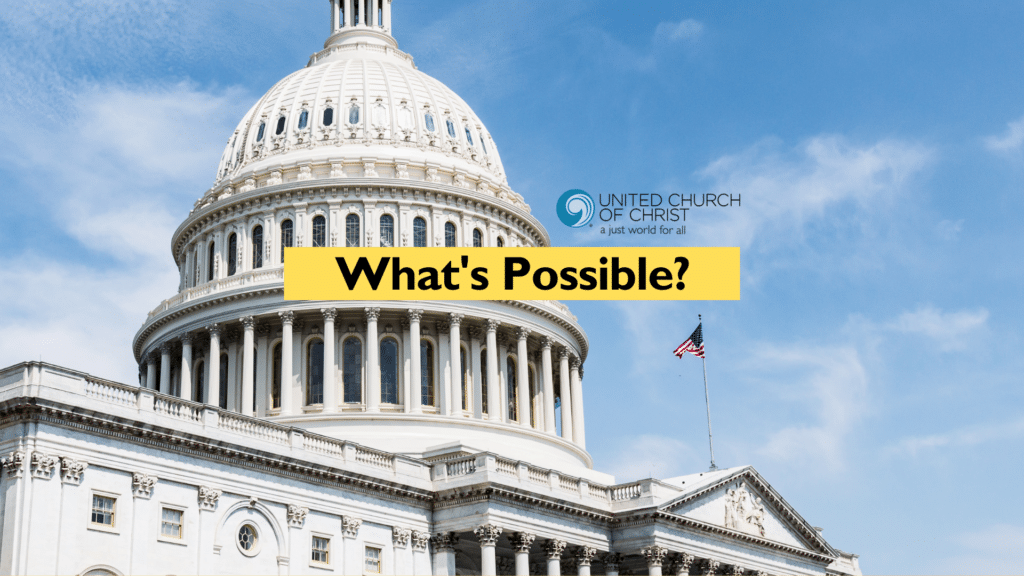Window open for new, humane U.S. policies in 2021, UCC advocates say
It’s a year of opportunity. It will take work. Church people can help. Now.
That’s the word from United Church of Christ policy advocates and their allies as they look ahead to 2021.
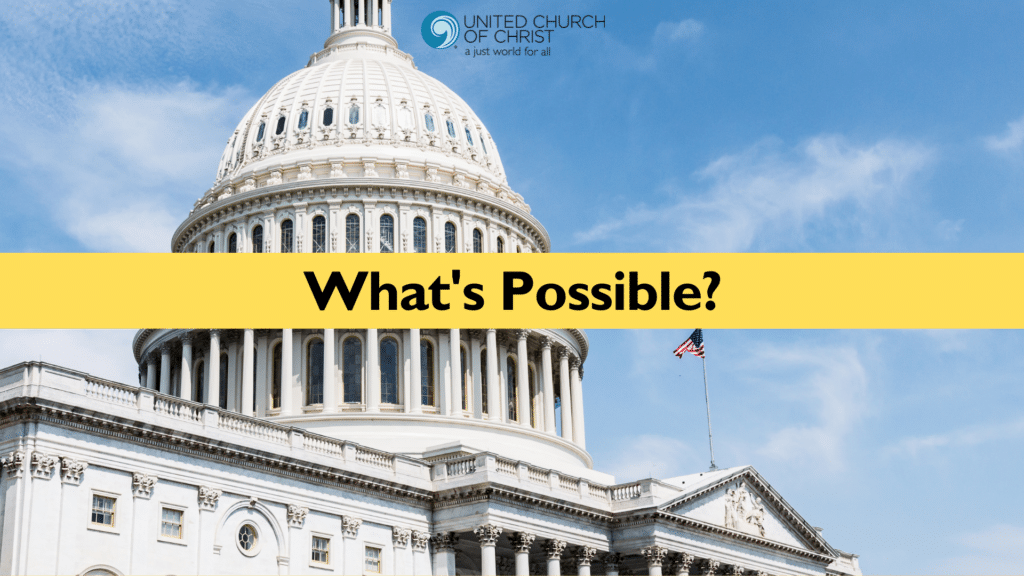
Changes in the White House and the Senate could mean “a renewed will in Washington to pursue policies that uphold human dignity,” said Katie Adams. She works in the UCC’s Capitol Hill office on social policies voted by the church’s General Synod.
“Already we’ve seen the Biden administration make sweeping changes with executive orders,” she said. “These pave the way for expanded COVID relief, a focus on racial justice and equity, and a dismantling of the chaotic and cruel immigration system of the past.”
The new president and his team say they care about low-income people and communities of color, said Emily Wirzba of the Environmental Defense Fund. “It will be really important to hold them accountable to that.”
To help, people can take specific actions, named below. But first, here are some issues advocates will focus on, in three categories: love of neighbor, children and creation. They are the UCC’s 3 Great Loves.
Love of neighbor
Advocates say immigrants face the same challenges we all do: the pandemic, health care and workplace safety, for example. But just being an immigrant magnifies those struggles.
“The importance of immigrants to our communities cannot be overstated,” Adams said. “Yet through law and practice, many immigrants are treated like second-class citizens, which diminishes their humanity – and our shared humanity.”
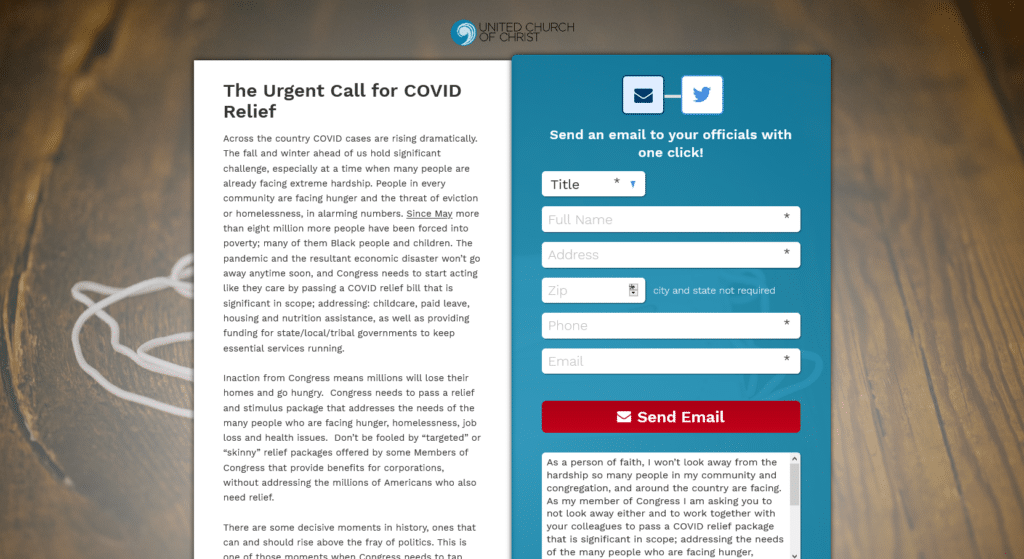
UCC advocates hope the White House and Congress will:
- End an immigration rule that keeps out “any alien who … is likely at any time to become a public charge.”
- Review all policies that, as Adams described them, “require people make the choice between a secure immigration status and enrollment in basic health and safety programs.”
- Get COVID relief to everyone. Right now, “many of our immigrant neighbors are denied even the chance to access these lifesaving programs,” Adams said.
- Protect front-line workers, especially during the pandemic. For example, Adams said, they need “paid leave, equal access to vaccines and the right to demand a workplace that is safe.”
- Prevent mistreatment of immigrant workers. “Because of the way the system is set up now, many are vulnerable to exploitation,” Adams said.
Farm workers, for example, endure abusive working conditions and threats of deportation and retaliation, she said. “We need to reduce their vulnerabilities, de-linking them from specific employers and constructing a system that offers opportunities for all workers to pursue a path to citizenship.”
Love of children
“Often, in policy making, children are an afterthought,” Adams said. Some 2.5 million more children are living in poverty now than at the start of the pandemic, she said, “and the majority of those kids are from Black and brown homes.”
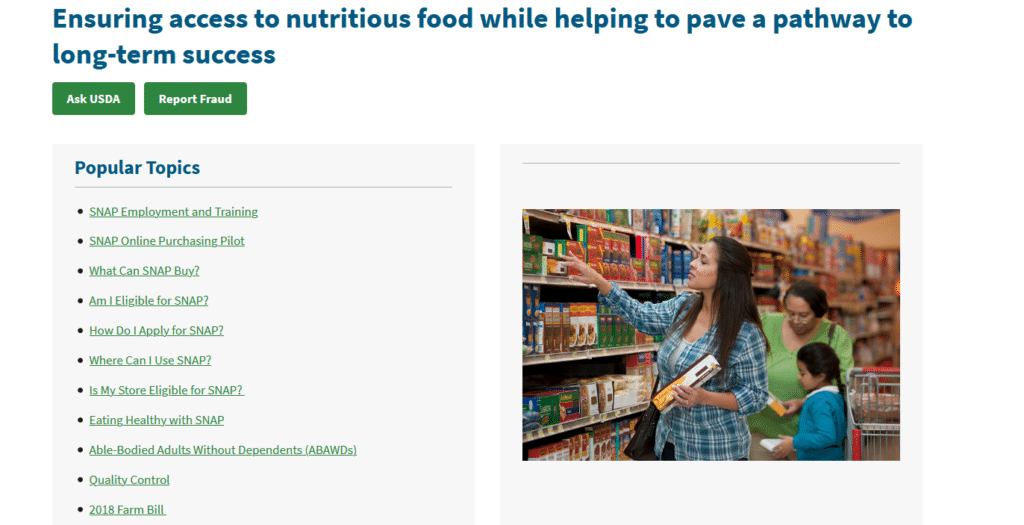
Advocates will push for:
- “Robust support for the Supplemental Nutrition Assistance Program throughout the pandemic and economic crisis.”
- Better access to paid family leave “so people don’t lose their jobs when someone is sick.”
- An end to Medicaid waivers that make access to health care burdensome.
- Expanding the Earned Income Tax Credit and Child Tax Credit.
- As mentioned above, ending the “public charge” rule. It keeps many families and children from getting basic safety-net help.
In other words, Adams said, it’s a good year to focus on “ensuring children are fed, housed and have access to quality health care and education.”
Love of creation
“I’m starting this new year optimistic,” said Wirzba, a government-relations specialist with EDF. She spoke during a UCC webinar, “What’s Possible: Faith and Climate Policy in 2021.” She noted that Sen. Chuck Schumer, the new majority leader, has said, “We will consider bold legislation to defeat the climate crisis by investing in clean infrastructure and manufacturing, which will create millions of good jobs for Americans regardless of ZIP code.”
Still, “passing legislation in an evenly divided Senate is going to be incredibly challenging,” Wirzba said. Bills will need bipartisan support — typically, at least 10 Republicans and all Democrats. House votes will be similarly close.
She named areas where she’s hopeful, including:
- Getting commitments from cabinet nominees. Wirzba said she wants the Senate to “ask climate nominees how they plan to prioritize environmental justice and equity issues in their federal agency work.”
- Going green with highways, mass transit and rail. “The House last year passed HR 2, the ‘Moving Forward Act,’ which was a massive green infrastructure bill,” Wirzba said. “There was also a bipartisan transportation infrastructure bill in the Senate that had a big climate section. So I think there’s a lot of interest in reviving these ideas.”
- Using the federal budget to press climate-conscious policies. Wirzba said the “incredibly wonky” process known as budget reconciliation “might be the opportunity to see the biggest climate action take place.” Policies produced that way need only a simple majority of support in the Senate. “You could use it for a clean electricity standard, or a price on carbon, newer, stronger tax credits, research and development funding, infrastructure investments. Some are thinking that this could be the opportunity to mandate carbon-free electricity by 2035.”
Overall, Wirzba said, “I think we have a really good chance to both de-carbonize our electric sector and our transportation sector, and to push for environmental justice and equity policies within that.”
What people of faith can do
Adams noted that the UCC offers a simple tool for people to find their legislators, here. And the “Take Action” page of the UCC Justice and Peace Action Network makes it easy for people to add their names to calls for action. Updated regularly, they cover issues like all of those listed above.
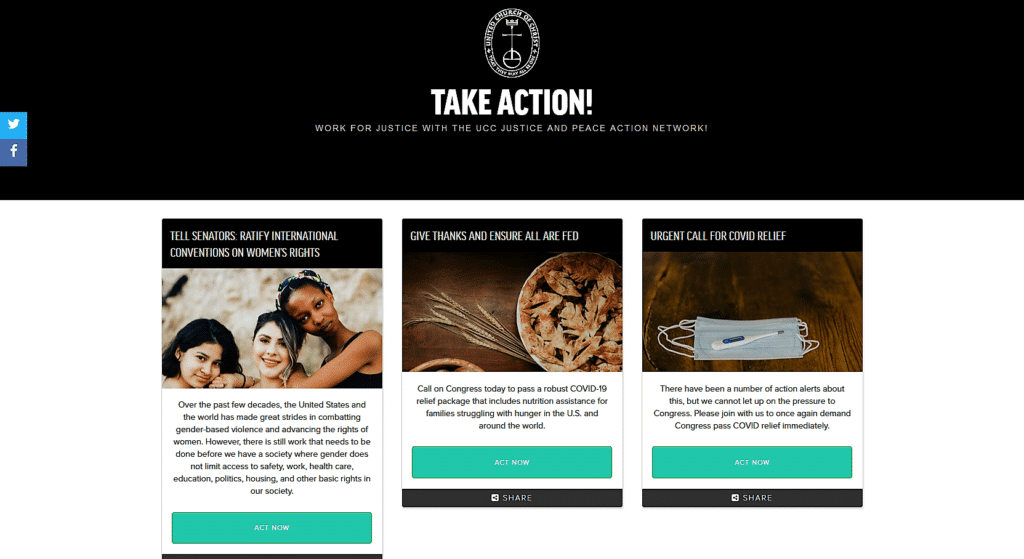
Three actions people can take right now:
Push COVID relief
“I would encourage UCC members to contact their member of Congress about passage of meaningful COVID relief, to start,” Adams said. “The deep economic morass that we find ourselves in means that many are experiencing extreme hardship.
“People need sustained direct payment assistance, relief from rent, mortgages and student loans, support in buying food and accessing health care. Our country must have organized leadership on equitable vaccine distribution, and our state and local governments need assistance so critical services are not suspended.”
Press cabinet nominees
Now is the time to tell senators to get commitments from Biden’s cabinet nominees to “use climate as a lens” to view the work of their agencies, Wirzba said. “To me, this, right away, is a really great opportunity for the faith community to be involved, to get senators to ask questions that they want to have answered on the record.”
Build relationships with legislators
“I always go back to: the most important thing you can do is advocate in your local community,” Wirzba said. Part of that, she said, is “being able to go in and talk with your members of Congress and their staff, and actually starting that citizen lobbying process, and letting them know what those important goals are.”
“I’d encourage folks to reach out to their member of Congress and introduce themselves, ask to set up a virtual visit to share what matters to them with their representatives,” Adams said. “This is an important part of advocacy.
“Joining the Justice and Peace Action Network is another great way to connect to the advocacy work of the UCC, and we’d love for people to connect with us.” It offers weekly alerts, a monthly newsletter and biblical and worship materials about faith and justice.
Why faith voices matter
“To me, what’s always been so powerful about the faith community is this ability to speak with moral clarity and to really call out what it means to love our neighbor,” Wirzba said. “There’s this prophetic voice that the faith community has, and I think that can cut through a lot of the partisan discord and a lot of the hate.”
In 2021, “I think we have a lot more opportunities,” she said. “Things won’t necessarily be easy, but I’m really excited for what’s to come.”
Related News
A Prophetic Call for Justice and Peace in Palestine
The executive leaders of the United Church of Christ have issued the following statement...
Read More‘Love is Greater Than Fear’: Regional Youth Events get to the heart of gospel message
United Church of Christ teens attending this summer’s Regional Youth Events (RYE) are...
Read MoreUCC desk calendars available to order now
Prepare for your day, month and year with the United Church of Christ desk calendar —...
Read More